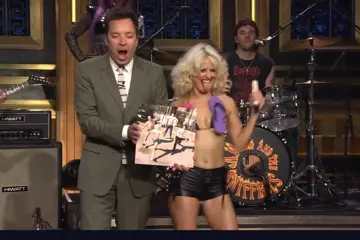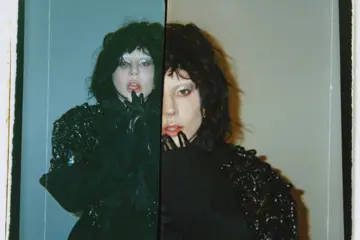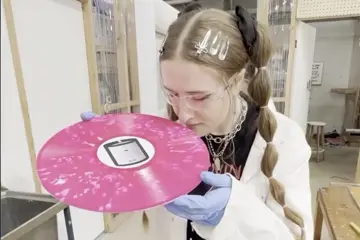If you've seen the press photos or videos for Institute at Sydney Festival, you may have noticed the same two things we did: the rigorous physicality and the three-piece suits. We asked performer Chris Evans whether it gets hot in those costumes. The answer: the performers each lose about three pints of sweat per performance. "It's the most impractical show I think I've done," he laughs, "but for sure the most fun."
This show may be fun for its performers, but Evans and his fellow ensemble members from UK outfit Gecko are acutely aware that, with Institute, they've crafted quite a heavy experience. The show has grown from Gecko director Amit Lahav's musings on the idea of care. How, he asked his team, do we care for each other in a world of high-pressure targets and expectations?
"The lights will be a massive storyteller, the set is a massive storyteller, and you are expected to be fully engaged as an active audience member."
The psychology of caring is perhaps most interesting in light of the fact that most of the team are men. Originally, the cast had been four men and one woman, and Evans described how the role of carer was often pushed onto, or taken up by, the woman on stage. When she had to leave the production — for unrelated reasons — and the best available replacement was a man, the dynamics of care between five men became a central interest and tension within the show. Evans notes that audiences have responded strongly to this dynamic: "men caring for each other... the one unified experience that people seem to have is this feeling of... 'Why can't men just be able to ask for help a bit more, and understand their vulnerabilities a bit more and share them?'"
As one might expect from a show dealing with mental health, the show has hit a nerve for a lot of audience members. And so, Gecko has remained conscious throughout their process of expanding the theme of "care" into the way the work is presented to audiences. The physical and visual nature of the show aids in this: "to help people abandon having an intellectual journey only, and get into a more visceral, poetic one." Evans describes the audience and their live response to the work as "punctuation" to what is happening on stage, and performers are always keenly aware of this relationship. But beyond this, the company has also followed through on caring for their audience in a more tangible way. In previous seasons of the work, an accompanying suite of programs and materials was developed with mental health professionals. The "Wellcome Project", created with Suffolk Mind and other mental health bodies, facilitated post-show discussions, reading materials, workshop experiences and access to mental health professionals in the foyer after each show.
Aside from caring for their audiences, the ensemble has had to think about caring for one another, too. "Taking care of each other is quite helpfully layered into the story," says Evans. There are patient characters and carer characters, but these relationships are inverted as patients come to care for one another, and carers in turn ask for care. In this way, each of the performers experiences moments of receiving care throughout the show. And this care relationship extends outside of the narrative, too. "[As performers] we're completely reliant on each other — falling off tables and being caught, being slung around... that level of trust that comes just from rigorously working together."
Although Institute began with the specific theme of "care", audiences tend to walk away from the production with widely varying ideas about the narrative and meaning of the show. As a company, Gecko are interested in making works that are open to interpretation and so rather than following one narrative throughout the show, the audience is guided through a series of poetic vignettes. The company's process involves looking at very specific moments or feelings, but boiling them down into a lyrical, abstract form. When these moments are stitched together in the show, says Evans, audience members are able to form their own interpretations. "You're not gonna be helped with words. The lights will be a massive storyteller, the set is a massive storyteller, and you are expected to be fully engaged as an active audience member... Gecko shows assume that the audience are very emotionally intelligent people, and makes it work accordingly."
Gecko present Institute, 25 — 28 Jan at the Seymour Centre, part of Sydney Festival















